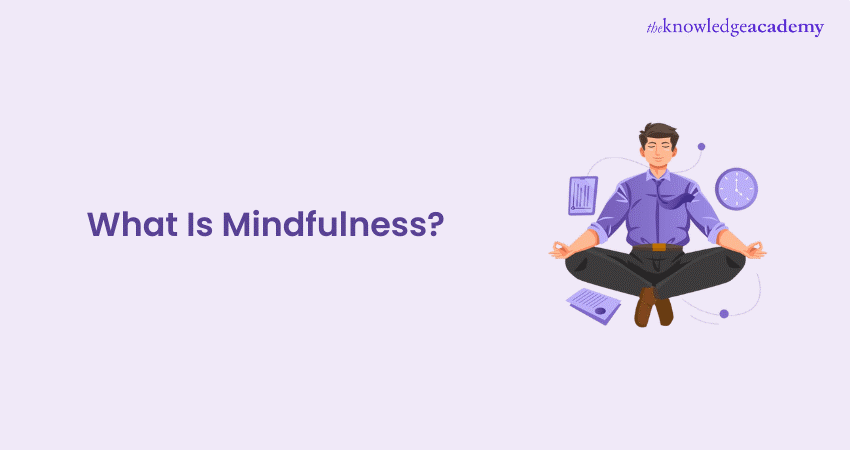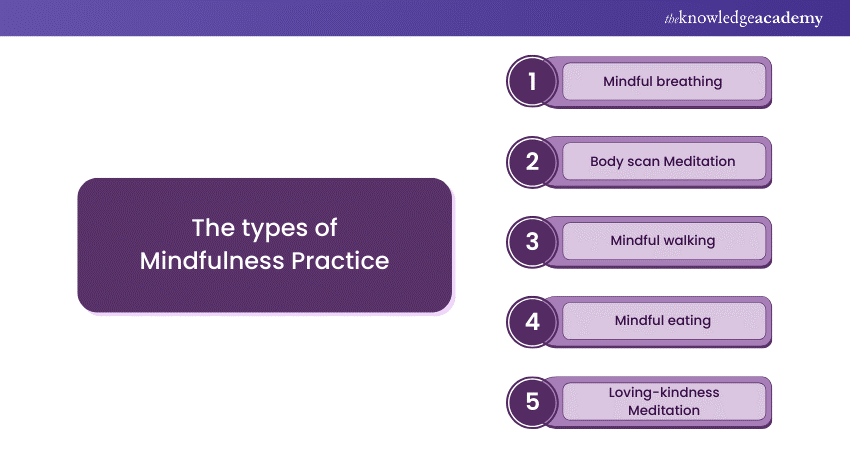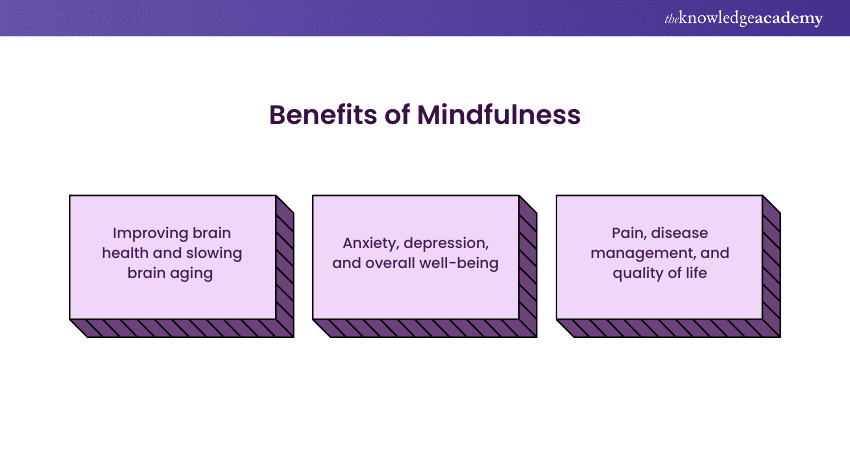We may not have the course you’re looking for. If you enquire or give us a call on +61 272026926 and speak to our training experts, we may still be able to help with your training requirements.
Training Outcomes Within Your Budget!
We ensure quality, budget-alignment, and timely delivery by our expert instructors.

Feeling swamped by life’s chaos? Work stress, heartbreaking news, and the daily grind can take a toll. But fear not! Mindfulness is here to rescue your sanity. It’s not just a trendy buzzword; it’s like a superhero cape for your mind and emotions. But What is Mindfulness?
Mindfulness is more than just a buzzword; it's a transformative tool for enhancing mental and emotional well-being. But What is it really? This blog will share insights on What is Mindfulness and how you can practice it. Read along and discover the various benefits being mindful has to offer.
Table of Contents
1) What is Mindfulness?
2) The Types of Mindfulness Practice
3) Benefits of Mindfulness
4) Impact of Mindfulness on Mental Health
5) Key Facts About Mindfulness
6) Conclusion
What is Mindfulness?
At its core, Mindfulness is about paying attention to the present moment without judgment. It involves being intentional about your thoughts and actions. This practice helps you become more connected to the here and now. It also helps you avoid being caught up with the could-bes and maybes that may stress you out. Doing so can reduce stress, improve concentration, and enhance the overall quality of your life.
Mindfulness is rooted in ancient meditation practices, predominantly in Buddhist traditions. However, it has been widely adapted in modern times for secular use. This made it accessible to everyone regardless of their spiritual or religious beliefs. It encourages observing your internal and external experiences without attempting to change or judge them, promoting acceptance and greater peace and understanding.
The types of Mindfulness Practice
Mindfulness is not to be seen as a one-size-fits-all solution. There are various methods to incorporate Mindfulness into your daily routine, each with its unique benefits:

1) Mindful Breathing
This is one of the easiest ways to practice Mindfulness and, for that reason, one of the most effective. You concentrate your mind on your breathing process. In time, you will begin to develop awareness of air coming into and out of your body. This practice helps in managing anxiety, stress, and other related conditions as it enhances the ability to focus on the current moment.
Specifically, the exercise of Mindful Breathing can be done almost everywhere, which makes it easily accessible and highly effective when it comes to reducing stress and anxiety.
2) Body Scan Meditation
In this practice, you focus on various areas of your body from the tip of toes to the crown of your head. The body scan is a form of meditation focusing on relaxation of muscles and increasing bodily sensations. This allows you to have a closer connection with your body. It is useful for those who suffer from chronic pain or tension, as it aids to depress your bodily sensations.
3) Mindful Walking
When practising Mindful Walking, you are to concentrate on the act of walking. Be aware of your lower limbs and the contact with the earth as well as the other sensations that are in the environment. This could be rather invigorating and humbling. It helps you to have access to nature and your environment. You can so this in a park, on a trail, or even around where you live.
4) Mindful Eating
Mindful Eating entails directing complete focus on the process as well as the experience of chewing and swallowing food and beverages. This, of course, involves paying attention not only to the physical characteristics of food, such as colours, smell, texture, taste, and temperature, but also to the sound that it makes.
Eating mindfully can help you reduce stress and find a new way of interacting with what you eat. It will help you prevent overeating and still be able to eat your meals and taste their flavours thoroughly. It is a concept that entails enjoying the process of chewing and being conscious during the time one spends on eating.
5) Loving-kindness Meditation
This practice entails the cultivation of all positive energy towards oneself and towards others. Saying positive phrases like ‘I am loved, and I am happy’ or ‘I am calm, and I spread love and kindness’ during meditation practice can also help to foster more kindness towards yourself and others. It can also help remind you that you are capable of empathy and controlling negative emotions.
Aid in creating a safe space for everyone around you with our Mindfulness Training - sign up now!
Benefits of Mindfulness
Mindfulness offers a plethora of benefits that can enhance various aspects of your life:

Improving brain health and slowing brain aging
The practice of routine Mindfulness meditation has led to the expansion of the grey matter of the brain, especially the sections that deal with memory, learning, and the regulation of emotions. This, in turn, can enhance one’s thinking ability and reverse some effects of ageing on the human brain. Research has also indicated that Mindfulness may improve neuroplasticity, the level of brain plasticity that involves the method by which the brain modifies its synaptic connections. It can help with memory enhancement, problem-solving, and even dealing with anger and aggression.
Anxiety, depression, and overall well-being
Practicing Mindfulness reduces the symptoms of anxiety and depression to a large extent. Application of the principle of Mindfulness helps to free oneself from negative thinking and switch to positive ones.
An important concept of Mindfulness is being able to acknowledge your thoughts and feelings but not let them consume you. This can lead to less rumination, lower levels of stress, and in general improved levels of well-being. Those who engage in Mindfulness daily express more stability and emotional satisfaction.
Pain, disease management, and quality of life
Another application of Mindfulness is chronic pain and diseases. It enables one to have a different perception of pain and thus reduces its impact on the quality of life. This means that with the practice of being fully aware of the sensations of the body. People can deal with pain much better without resisting it.
This can help diminish the perception of pain overall and enhance your ability to deal with it. It has also been found to enhance the quality of life for patients with fibromyalgia, irritable bowel syndrome and cardiovascular diseases.
Impact of Mindfulness on Mental Health
The impact of Mindfulness extends to various aspects of mental health and interpersonal relationships:
Anxiety Disorders
It has been established that anxiety disorders can be alleviated by using Mindfulness-based interventions. Research has shown that Mindfulness will help in the management of anxiety symptoms and their impact in the lives of patients.
Mindfulness makes you more conscious of the things that cause anxiety and how to respond to them in a proper manner. It may help decrease the frequency and severity of anxiety episodes and enhance the individual’s daily performance.
Learn to manage stress mindfully and build resilience with our Handle Stress And Develop Your Resilience Training - register now!
Depression
Mindfulness can prove to be a helpful resource in terms of avoiding relapse in cases of depression. It enables one to identify relapse warning signs of depression and ways of dealing with them.
By practising increased attention towards your thoughts and feelings, you can stop negative thoughts and arrive at a healthier way of thinking. Mindfulness-based Cognitive Therapy (MBCT) is particularly useful for preventing relapse in cases of recurrent depression
Relationship Issues
Mindfulness helps in enhancing the relationship because it can help one to listen, communicate and understand the other person better. It assists you in being more attentive in your communication, thus improving relationships and decreasing instances of disagreement.
Mindful practice enhances emotional intelligence and improves interpersonal interaction and conflict management. Mindfulness also assists individuals in improving appreciation or empathy towards their partners and, therefore, improving marriage or relationships.
Eating Disorders
The use of Mindfulness with clients suffering from eating disorders proves to be effective in helping the individual change their nutritional behaviours and thoughts about the body. It can support an open, watchful, non-shame framework for the eating experience and the feelings it can evoke.
Thus, when you decide to follow the Mindful Eating approach, you will promote a healthier and appropriate attitude toward food consumption, which will affect your psychological state with its help. Mindfulness also educates an individual to treat oneself kindly and accept that situation, which is crucial in the process of recovery.
Stress Management
There are a number of benefits that come from practising Mindfulness, while one of the most widely known is the stress-reducing characteristic. Furthermore, when you use Mindfulness, you can easily notice areas that may be stressing you and thus avoid excessive stress.
Stress management is also helped by Mindfulness because one can then notice the stressful factors and change your approach towards them. This is used to minimise the level of stress on the physical and emotional system, bringing wellness to an advanced level. Mindfulness practice is needed daily because it can help boost the immune system and improve sleep patterns and physical health.
Learn how you can prevent psychological distress for a happier, healthier tomorrow- sign up for our Prevention Psychology Training now!
Key Facts About Mindfulness
Mindfulness is a powerful practice that offers numerous benefits for both mental and physical well-being. Let’s delve into some of the key advantages of Mindfulness:
1) Mindfulness is a concept which is very flexible and can be applied to any activity, including walking, eating and even brushing teeth.
2) It originated from Buddhist practices and has increasingly been practised among modern societies, given its health impact.
3) This is not about merely clearing your mind, but the process of focusing on what is going through your mind and experiencing them keenly without passing any commentary on them.
4) The benefits of a long term practice may reduce the risk of Mental and physical diseases in the long run.
5) It means that it is possible to gain Mindfulness purposely, that is why it is used, and it does not depend on age and the background.
6) Mindfulness is at the centre of various scientific investigations, and definitely there are countless studies suggesting its ability to improve overall health and the human mental well-being.
7) Mindfulness can be practiced individually or in group settings, making it accessible to everyone.
Conclusion
This blog gave you insights into What is Mindfulness, the different ways to practice it, and various benefits it has to offer. From sharpening focus to soothing the soul, Mindfulness is your secret weapon for a calmer, more centred life. So, take a deep breath, embrace the present moment, and let mindfulness work its enchantment!
Frequently Asked Questions

You can start with just a few minutes a day and gradually increase the duration. Consistency is key, so practice Mindfulness daily, even if it's only for a short period. Over time, you'll likely find that even a few minutes of Mindfulness daily can significantly impact your overall well-being.

Yes, Mindfulness can improve sleep quality by reducing stress and promoting relaxation. Practices like mindful breathing and Body Scan Meditation can help you unwind and prepare for a restful night's sleep. Practising Mindfulness regularly can develop healthier sleep patterns and improve your overall sleep hygiene.

The Knowledge Academy takes global learning to new heights, offering over 30,000 online courses across 490+ locations in 220 countries. This expansive reach ensures accessibility and convenience for learners worldwide.
Alongside our diverse Online Course Catalogue, encompassing 17 major categories, we go the extra mile by providing a plethora of free educational Online Resources like News updates, Blogs, videos, webinars, and interview questions. Tailoring learning experiences further, professionals can maximise value with customisable Course Bundles of TKA.

The Knowledge Academy’s Knowledge Pass, a prepaid voucher, adds another layer of flexibility, allowing course bookings over a 12-month period. Join us on a journey where education knows no bounds.

The Knowledge Academy offers various Health & Safety Courses, including Advance First-Aid Training, Active and Healthy Lifestyle Training, and Counselling Certifications. These courses cater to different skill levels, providing comprehensive insights into What is Yoga.
Our Health & Safety Blogs cover a range of topics related to Psychology, offering valuable resources, best practices, and industry insights. Whether you are a beginner or looking to advance your Health and Safety knowledge, The Knowledge Academy's diverse courses and informative blogs have you covered.







 Top Rated Course
Top Rated Course




 If you wish to make any changes to your course, please
If you wish to make any changes to your course, please


